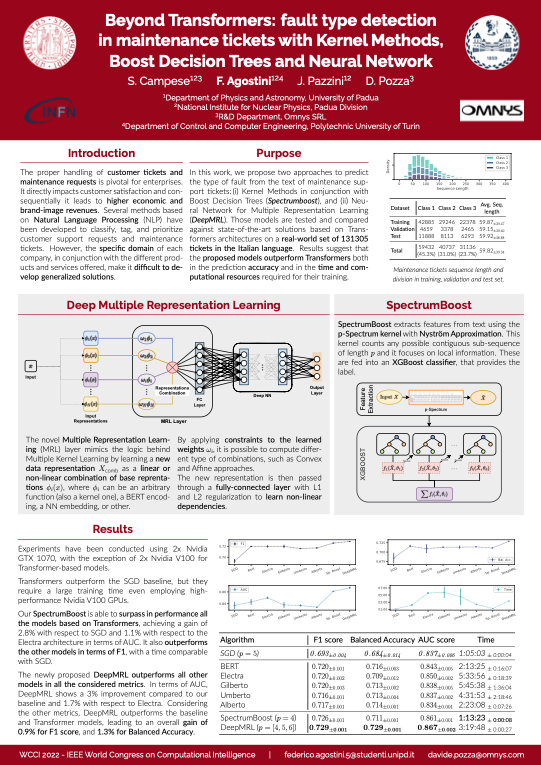IEEE WCCI (World Congress on Computational Intelligence), July 18-23, 2022 in Padua, Italy, https://wcci2022.org, is the world's leading conference on computational intelligence, bringing together under one roof: (1) Neural Networks and Deep Learning, (2) Fuzzy Reasoning, and (3) Evolutionary Computation. On this occasion, Omnys had the opportunity to publish a paper in the leading journal IEEE Transactions on Neural Networks and Learning Systems and to exhibit it at the IEEE WCCI.
With more than 2,000 attendees expected, the event is divided into three conferences (Joint 2022 International Conference on Neural Networks, IEEE International Conference on Fuzzy Systems, IEEE Congress on Evolutionary Computation) and two major related events: the INNOAI and the AI FORUM.

Especially the latter is one of the most important events for the Italian AI business landscape. Conceived and promoted by the Italian Association for Artificial Intelligence, the AI FORUM, in which Omnys has the opportunity to participate by presenting its paper, is an important event to understand the fundamentals of the current evolutions and to be able not only to adapt but also to anticipate the transformations, identifying the tools needed to compete in a world that is constantly evolving and accelerating.
Entitled "Beyond Transformers: Fault Type Detection in Maintenance Tickets with Kernel Methods, Boost Decision Trees and Neural Networks", the paper, produced in collaboration between OMNYS, the Department of Physics of the University of Padua, INFN Padua and the Department of Control and Computer Engineering of the Polytechnic University of Turin, aims to show how the automatic detection and prediction of technical faults from maintenance tickets and service requests can ensure faster and more effective responses to the troubleshooting of certain equipment, thereby reducing maintenance costs.
The study then considered two alternative approaches: the Kernel Method combined with Boost Decision Trees (SpectrumBoost) and Neural Networks for Multiple Representation Learning (DeepMRL). These models were then tested and compared on a real set of 131,305 maintenance tickets, ultimately demonstrating an accuracy of nearly 90 percent.
In fact, the proper handling of customer tickets and maintenance requests is an important issue that affects many organizations and has a direct impact on customer satisfaction. The ability to respond quickly and effectively to resolve reported issues is a key factor in generating positive feedback, both in terms of increased revenue and improved corporate image.
This study has shown how a Machine Learning and artificial intelligence approach can help companies be more productive and efficient, even in critical situations.